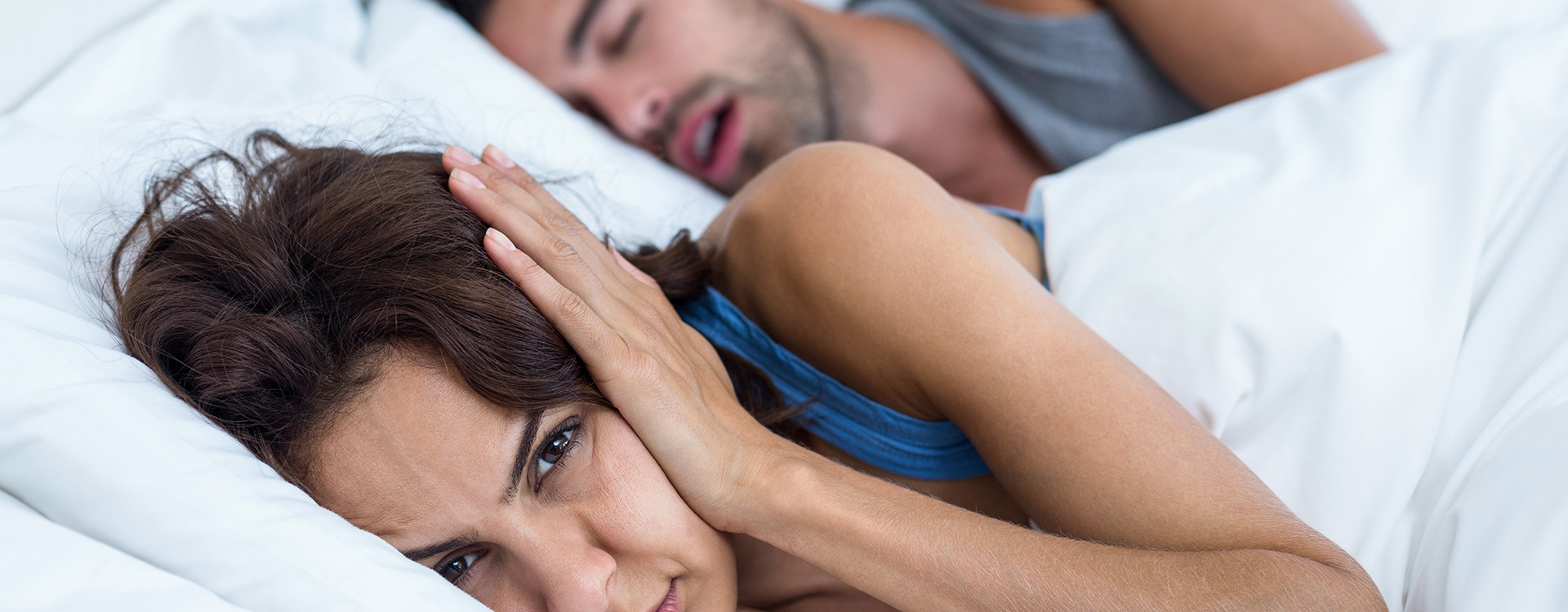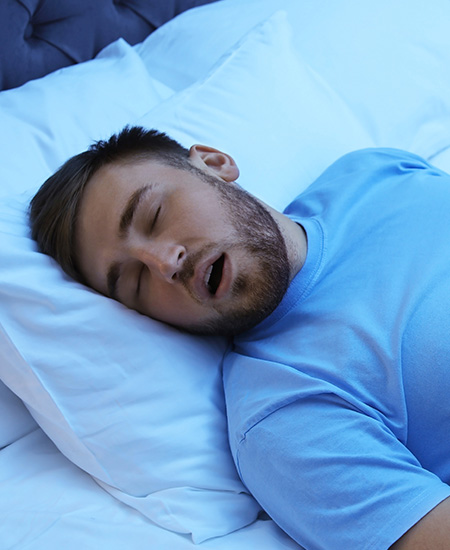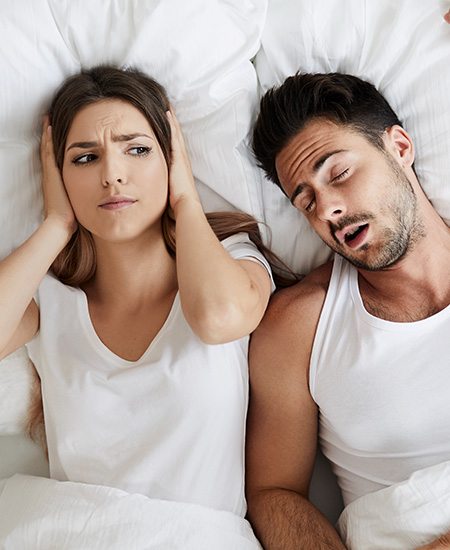
Having trouble sleeping?
Sleep apnea is a breathing disorder characterized by brief interruptions of breathing during sleep. Obstructive Sleep Apnea, or OSA, is a type of sleep apnea caused by a partial or complete collapse of the airway when the muscles controlling the soft palate and tongue relax.
Dr. Robinson is one of the few dentists in the area who has had specialized training in treating patients who suffer from sleep apnea.
Schedule a free screening and talk to Dr. Robinson about your options for treatment.
Sleep Dentistry: It can treat your sleep apnea
What is sleep apnea?
Sleep apnea is a breathing disorder characterized by brief interruptions of breathing during sleep. “Apnea” comes from the Greek word meaning “want of breath” and is clinically defined as any cessation of breath lasting 10 seconds or more.
There are three types of sleep apnea:
Obstructive Sleep Apnea (OSA) is the most common type of sleep apnea and occurs when soft tissue in the rear of the throat collapses, closing the airway and causing the sleeper to stop breathing. This may occur as many as 30 times or more an hour and cause breath cessations lasting anywhere from 10 seconds to 3 minutes.
Central Sleep Apnea occurs when the brain fails to signal the diaphragm and chest muscles to breathe (this is more common in older adults as well as those suffering from heart disease or neurological disorders).
Mixed Sleep Apnea is a combination of the first two types of sleep apnea. First, the brain fails to signal the chest to breathe; then, when the diaphragm suddenly begins moving, the airway is blocked by an obstruction. It is not uncommon for someone to experience all three types of apnea in a single night.
If you think you are currently suffering from one of these types of sleep apnea, contact Pike Creek Dental to schedule a free screening.
How does sleep apnea affect your health?
Sleep apnea reduces blood oxygen levels and interrupts REM sleep (the deep, restorative sleep cycle), putting strain on the heart, depriving the brain of oxygen and costing you the quality, restorative sleep you need.
The consequences range from annoying disturbances to life-threatening situations such as:
- Depression
- Irritability
- Sexual dysfunction
- Learning and memory difficulties
- Increased risk of accident from falling asleep while driving
- High blood pressure
- Heart attack, congestive heart failure, cardiac arrhythmia and stroke
It has been estimated that as many as 50% of sleep apnea sufferers are diagnosed with high blood pressure. The risk for heart attack and stroke may also increase, resulting in an overall increase in risk for premature death.
Protect your health and lower your sleep apnea risk factors.


How do I know if I have sleep apnea?
The most typical sleep apnea symptoms are loud/excessive snoring and falling asleep at inappropriate times during the day, even though you’ve had “a good night’s sleep.” Other symptoms can include:
- High blood pressure
- Memory problems
- Morning headaches
- Feeling of depression
- Gastro-esophageal reflux (heartburn)
- Impotence
- Nocturia (frequent night time urination)
- Weight gain
- Limited attention
- Lethargy
- Poor judgment
- Personality issues
- Hyperactivity, especially in children
A family history of sleep apnea, excess weight, large neck, recessed chin or known abnormalities in the upper airway are risk factors, as well as smoking and alcohol use.
If you are experiencing some or all of the sleep apnea symptoms listed above or want to stop snoring, contact Pike Creek Dental and schedule a consultation to begin your journey on the way to a better night’s sleep.
I hate my C-PAP
Sleep medicine has come a long way over the past few years. CPAP used to be the only option for sleep apnea treatment and CPAP therapy was prescribed for mild and moderate as well as severe cases. Today, you have options. If your CPAP appliance is burdensome, it only makes sense to consider retesting your past diagnosis to determine if an oral appliance is a medically appropriate treatment for sleep apnea.
After all, the main goal is to enjoy better sleep, so find out more about helping your CPAP intolerance at Pike Creek Dental. We can provide you with the information you are looking for on CPAP alternative treatment.
What is Sleep Dentistry?
Dentists who specialize in Sleep Dentistry are experienced in treating snoring and sleep apnea using custom-made Mandibular Repositioning Devices (MRAs) to re-position the lower jaw, tongue and soft palate. Wearing an MRA at night increases airflow and reduces snoring. These custom-made oral appliances are FDA approved and accepted by the American Academy of Sleep Medicine as a first line of treatment for mild to moderate sleep apnea.
Learn more about how a custom-made MRA can help your sleep apnea by contacting Pike Creek Dental.
How does the dental solution compare?
Unlike CPAP therapy using masks, hoses and electric pumps, the custom-made MRA oral appliance is simply inserted in the mouth before bed, similar to an athletic mouthpiece. It works to open your airway by moving the jaw and tongue forward and increasing muscle tone in the soft palate to prevent obstruction.
MRA oral appliances are proven effective in eliminating snoring and treating sleep apnea while avoiding the inconveniences and difficulties associated with traditional CPAP therapy.
If you are ready to get rid of your mask and try CPAP alternatives, or are suffering from CPAP intolerance, schedule a visit with Pike Creek Dental today.
What are the choices in oral appliances?
While there are over 200 FDA-approved oral appliances from which to choose from, our research and experience suggests the following oral appliances are not only some of the most widely used, but also the most successful in helping the vast majority of patients in regards to their sleep apnea. They include:
- The Moses
- Somnomed
- The EMA
- The TAP
- The Oasys
- The Respire
- The Dorsal Narval CC
Of course, the effectiveness of each oral appliance varies from patient to patient, and each having specific advantages and disadvantages. That’s why it is vital to speak with your dentist to determine which appliance will be the most suitable for you, your oral structure and your sleep apnea problem.
Get more information about the different oral appliances for sleep apnea, and find out what might be the best option for you.
What is the procedure?
The only way to diagnose sleep apnea correctly is an overnight sleep study: a comprehensive recording of the bio-physiological changes that occur during sleep. In the past, the polysomnogram, or PSG, has typically been performed at night in a hospital or “sleep center.” Due to advances in technology, patients may now opt to have one conducted in the comfort of their home. An HST, home sleep test, typically monitors between five and twelve body functions including brain wave activity, eye movements, muscle activity/tension, heart rhythm, achievement of various sleep stages, oral & nasal airflow and respiratory effort/efficiency during sleep.
Our insurance-paid home sleep study usually provides a very accurate representation of your actual sleep patterns. It is covered by most insurance plans with a low deductible and allows you to sleep in your own bed and on your own schedule. No technician is required for set-up and your test can be scheduled within days…not weeks.
The home study unit is shipped directly to you. The system provides easy step-by-step instructions and voice prompted commands along with single-button simplicity. When the sleep study is completed, you simply return the test unit in the prepaid postage package we provide. The results are interpreted by a board-certified sleep physician and made available to you through a consultation with your dentist.
For more information on a home sleep test, contact Pike Creek Dental and schedule a free screening.
Does my health insurance cover Sleep Dentistry?
The short answer, in almost all cases, is “yes.” With a diagnosis of mild or moderate sleep apnea from a board-certified sleep physician, an oral appliance can be prescribed as a sleep apnea treatment and would be considered a medical necessity.
Of course, coverage can vary by state, insurance provider and specific insurance plans or policies. In most cases, you will have a much higher reimbursement from your medical insurance than from a dental policy (if you have one.) Two factors will determine your coverage regarding sleep dentistry: your plan’s allowable amount for an oral appliance and your plan’s deductible, which we will determine for you during your screening. Once your screening is complete, we will be able to run a “verification of benefits” to determine what the specific costs for treatment will be for you.
If you already have a CPAP, but aren’t using it (like nearly 70% of CPAP users), we can work with your doctor to obtain documentation that you are non-compliant with CPAP treatment. In that case, your medical insurance will cover oral appliance therapy in addition to the CPAP machine you already have.
To find out if your insurance covers oral appliances or sleep dentistry, simply call our office or use our website to request an oral appliance consultation.
Do I need to see my doctor first?
If your in-home overnight sleep study results indicate mild to moderate sleep apnea, you won’t need a referral; the test is read by a board-certified sleep physician fully qualified to make a diagnosis. (If your insurance requires your primary care physician to be notified, we will do so on your behalf.)
However, if your test results indicate severe sleep apnea or another suspected sleep condition, you will need to consult with your doctor unless you’ve already been deemed “non-compliant” for a CPAP appliance.
We understand that most people think of sleep apnea as a medical issue to be treated by an MD. But in truth, only a dentist can properly fit you with an oral appliance. That said, we will work closely together with your doctor to make certain we are in concurrence before moving forward with your oral appliance therapy.
Contact Pike Creek Dental for a free consultation and plan that you can review with your primary care doctor if you choose to.

Dr. Ryan and his team are always friendly, knowledgeable, and skillful in their work. My previous experiences had mainly been with the hygienists, who are all excellent, but I had my first cavity and the procedure for a filling was nothing short of impressive. Quick and painless!
Definitely recommend Pike Creek Dental, exceptional service through out the entire practice I would describe myself as not the biggest fan of going to the dentist and I have no problem going here.
